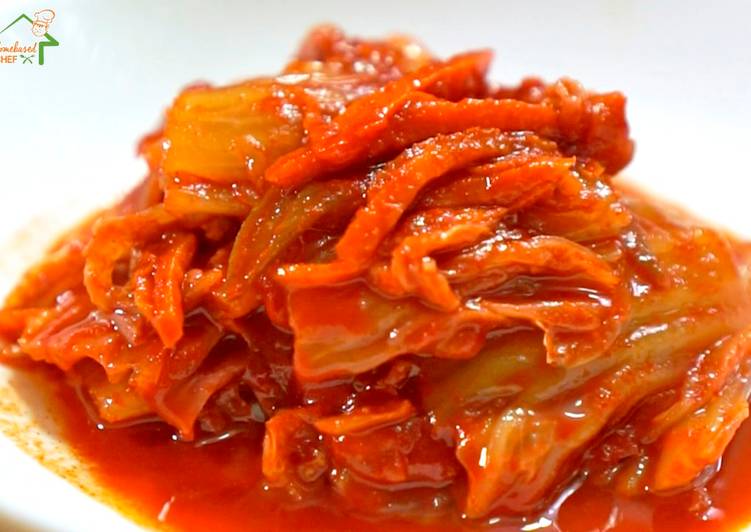Korean Kimchi. Kimchi is a traditional Korean dish made of seasoned vegetables and salt. Koreans eat it at nearly every meal. It can be fresh, like a salad, or it can be fermented.
 Kimchi, also spelled gimchi or kimchee, refers to a traditional Korean fermented dish made of seasoned vegetables.
The most common Korean banchan, Koreans eat kimchi eaten with rice along with other banchan dishes.
Korean Kimchi. this link is to an external site that may or may not meet accessibility guidelines.
You can have Korean Kimchi using 14 ingredients and 7 steps. Here is how you achieve that.
Kimchi, also spelled gimchi or kimchee, refers to a traditional Korean fermented dish made of seasoned vegetables.
The most common Korean banchan, Koreans eat kimchi eaten with rice along with other banchan dishes.
Korean Kimchi. this link is to an external site that may or may not meet accessibility guidelines.
You can have Korean Kimchi using 14 ingredients and 7 steps. Here is how you achieve that.
Ingredients of Korean Kimchi
- Prepare 2 pieces of Chinese Cabbage.
- You need 1/2 cup of Rock Salt.
- Prepare 1/2 cup of Glutinous Rice Flour.
- It's 1/4 cup of White Sugar.
- You need 3 cups of Water.
- It's 1 cup of Garlic.
- It's 2 tablespoons of Ginger.
- You need 1 cup of White Onion.
- Prepare 1 cup of Fish Sauce.
- It's 2 cups of Gochugaru.
- Prepare 4 stalks of Leeks.
- It's 1 piece of Carrot.
- It's 1 piece of Radish.
- Prepare of Honey (optional).
Although many people get a chill through their spine at the very mention of the Although the popularity of kimchi is still rising in the West, it is an ancient dish, dating about two. Bringing to you the authentic Taste of Korea amidst posh settings at very affordable prices! Napa Cabbage Kimchi from 'Maangchi's Real Korean Cooking'. Traditional style kimchi recipe that can made into all kinds of Korean side dishes from soups to fried rice.
Korean Kimchi instructions
- PREPARE THE CABBAGE Cut the cabbage lengthwise into quarters, then chop into bite-size pieces. Soak in cold water for 5 minutes. Drain and transfer to a large bowl..
- Add 1/2 cup salt and mix well; turn it over after 30 minutes. - repeat 2x (total of 1 hour) Rinse and drain for 3x. Squeeze out water on the last time, put on a strainer and let it air dry for 30 minutes..
- MAKE THE GLUTINOUS PASTE Dilute the rice flour in water. Heat and bring to boil while stirring, for about 5 minutes. Lower the heat. When you see it bubbling, add sugar. Cook for a few more minutes until it becomes translucent. Let it cool completely. Tip: To cool faster, but the pot in a pan half-filled with water; just make sure that the pot is taller than the pan..
- PREPARE THE KIMCHI SAUCE Using the food processor, chop and blend the garlic, ginger, onion, and fish sauce for about 1 minute. Mix it with the cooled glutinous paste and hot pepper flakes..
- Wash the leeks thoroughly. Dry it with paper towel and cut diagonally. Peel the carrot and radish and cut into thin strips. Add the leeks, carrots, radish, (and honey) to the kimchi sauce and mix well. You can taste test and adjust depending on the level of heat, saltiness, and sweetness that you prefer..
- MIX THE KIMCHI In a clean large bowl, put the cabbage and add the sauce gradually. Use clean and dry hands (or use a clean food-grade gloves) to mix the ingredients. Make sure to distribute the kimchi sauce evenly and all cabbage pieces have been covered with sauce. Transfer to a clean container and press it to remove air bubbles. Leave at room temperature and place in a dark area or cover it with dry clean towel. Transfer to the ref on the 3rd day..
- Best eaten after its 1st to 2nd week of fermentation..
Korean Kimchi Everything you need to know with Kimchi Pictures. In its simplest form, Korean Kimchi is fermented cabbage (Chinese cabbage) with red pepper powder. Kimchi is a traditional Korean dish of fermented vegetables, the most common of which are napa cabbage and daikon radish. In addition to being served as banchan, Korean side dishes presented as. With a kick and a tang, Kimchi is becoming a global phenomenon.